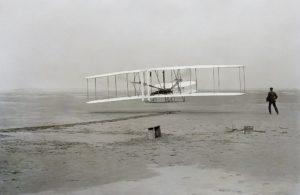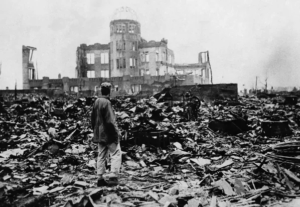20th Century:
1903 (Wright Brothers at Kitty Hawk)
 Wilbur and Orville Wright were American inventors and pioneers of aviation. In 1903 the Wright brothers achieved the first powered, sustained and controlled airplane flight at Kitty Hawk, North Carolina. Always working on different mechanical projects and keeping up with scientific research, the Wright brothers closely followed the research of German aviator Otto Lilienthal. These Ohio brothers were constantly trying to figure out how to design wings for flight. They observed that birds angled their wings for balance and control, and tried to emulate this, developing a concept called “wing warping.” When they added a moveable rudder, the Wright brothers found they had the magic formula-on December 17, 1903, they succeeded in flying the first free, controlled flight of a power-driven, heavier than air plane. Wilbur flew their plane for 59 seconds, at 852 feet, an extraordinary achievement.
Wilbur and Orville Wright were American inventors and pioneers of aviation. In 1903 the Wright brothers achieved the first powered, sustained and controlled airplane flight at Kitty Hawk, North Carolina. Always working on different mechanical projects and keeping up with scientific research, the Wright brothers closely followed the research of German aviator Otto Lilienthal. These Ohio brothers were constantly trying to figure out how to design wings for flight. They observed that birds angled their wings for balance and control, and tried to emulate this, developing a concept called “wing warping.” When they added a moveable rudder, the Wright brothers found they had the magic formula-on December 17, 1903, they succeeded in flying the first free, controlled flight of a power-driven, heavier than air plane. Wilbur flew their plane for 59 seconds, at 852 feet, an extraordinary achievement.
Source: http://www.history.com/topics/inventions/wright-brothers
_____________________________________________________________
1945 ( Atomic Bomb – Hiroshima, Japan)
 The United States military dropped the first atomic bomb on the Japanese city of Hiroshima on August 6, 1945. The explosion wiped out 90 percent of the city and immediately killed 80,000 people; tens of thousands more would later die of radiation exposure. Three days later, another A-bomb was dropped on Nagasaki, killing an estimated 40,000 people. Japan’s Emperor Hirohito announced his country’s unconditional surrender in World War II in a radio address on August 15, citing the devastating power of “a new and most cruel bomb.” The dropping of the atomic bomb would usher in a new era of military hardware which changed the nature of world warfare forever. Though the bombings of Japan remain the only wartime use of nuclear weapons, since 1945 the threat of nuclear war has loomed over international conflicts, promising a level of “prompt and utter destruction” never before seen in the world. The development of the atomic bomb had repercussions that would continue to resonate throughout the twentieth century, particularly in the Cold War (1947-1993).
The United States military dropped the first atomic bomb on the Japanese city of Hiroshima on August 6, 1945. The explosion wiped out 90 percent of the city and immediately killed 80,000 people; tens of thousands more would later die of radiation exposure. Three days later, another A-bomb was dropped on Nagasaki, killing an estimated 40,000 people. Japan’s Emperor Hirohito announced his country’s unconditional surrender in World War II in a radio address on August 15, citing the devastating power of “a new and most cruel bomb.” The dropping of the atomic bomb would usher in a new era of military hardware which changed the nature of world warfare forever. Though the bombings of Japan remain the only wartime use of nuclear weapons, since 1945 the threat of nuclear war has loomed over international conflicts, promising a level of “prompt and utter destruction” never before seen in the world. The development of the atomic bomb had repercussions that would continue to resonate throughout the twentieth century, particularly in the Cold War (1947-1993).
_____________________________________________________________
1974 (Nixon Departs)

President Richard Milhous Nixon leaves the White House for San Clemente, California upon his resignation in August 1974. It marks the first time in US history were a sitting president resigned from office. With impeachment proceedings underway against him for his involvement in the Watergate affair, Nixon was finally bowing to pressure from the public and Congress to leave the White House. “By taking this action,” he said in a solemn address from the Oval Office, “I hope that I will have hastened the start of the process of healing which is so desperately needed in America.” Vice President Gerald R. Ford was sworn in as the 38th president of the United States in the East Room of the White House. After taking the oath of office, President Ford spoke to the nation in a television address, declaring, “My fellow Americans, our long national nightmare is over.” He later pardoned Nixon for any crimes he may have committed while in office, explaining that he wanted to end the national divisions created by the Watergate scandal.
Source: http://www.history.com/this-day-in-history/nixon-resigns
______________________________________________________________